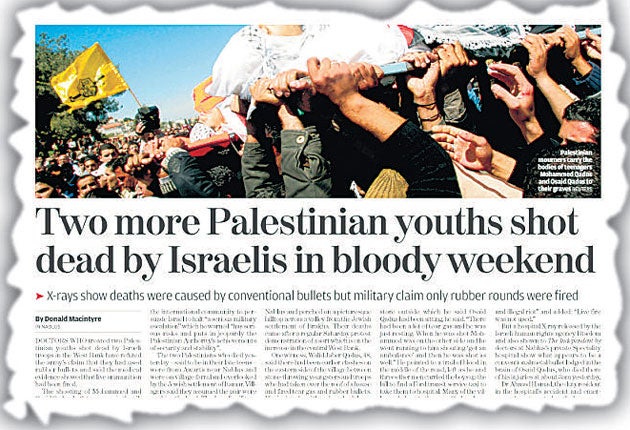Israeli soldiers given minor reprimands over shooting of Palestinian civilians

Your support helps us to tell the story
From reproductive rights to climate change to Big Tech, The Independent is on the ground when the story is developing. Whether it's investigating the financials of Elon Musk's pro-Trump PAC or producing our latest documentary, 'The A Word', which shines a light on the American women fighting for reproductive rights, we know how important it is to parse out the facts from the messaging.
At such a critical moment in US history, we need reporters on the ground. Your donation allows us to keep sending journalists to speak to both sides of the story.
The Independent is trusted by Americans across the entire political spectrum. And unlike many other quality news outlets, we choose not to lock Americans out of our reporting and analysis with paywalls. We believe quality journalism should be available to everyone, paid for by those who can afford it.
Your support makes all the difference.Israeli officers held responsible for the deaths of four Palestinians in the West Bank received only minor reprimands after an internal investigation concluded that the deaths could have been avoided.
Chief of Staff Gabi Ashkenazi, Israel's military chief, admitted that the incidents last month "could have ended differently" and could have "avoided causing harm to civilians".
The two fatal shooting incidents, just 24 hours apart, marked the most serious escalation of tensions in the occupied West Bank in months, and threatened to destroy the fragile calm that has persisted there in recent years.
In one case, Israeli soldiers fired on Palestinian protesters, killing two. In a second incident, a soldier killed two Palestinians who he claimed had tried to attack him. Mr Ashkenazi reprimanded two senior officers – a colonel and a lieutenant colonel – and removed a squad commander from his post, a military statement said. The soldiers who fired the lethal rounds appeared to escape censure.
Israeli human rights organisations denounced the military investigation, claiming that it failed to hold the soldiers accountable for their actions and upheld the army's culture of impunity.
"It is extremely rare for the Israeli security forces to be held accountable in cases where they have killed or injured Palestinian civilians," said Sarit Michaeli, a spokeswoman for B'Tselem, an Israeli NGO.
She said that the army should open criminal investigations into both cases rather than conduct "internal operational debriefs" that skirt the legal issues regarding the soldiers' actions. "There are credible allegations, these must be investigated," she said.
On 20 March, Israeli forces faced Palestinian protesters in the village of Iraq Burin as they tried to prevent clashes with extremist Jewish settlers from nearby Bracha. In the ensuing skirmish, Israeli soldiers killed two Palestinian teenagers, Mohammed Qadus and Osaid Qadus.
The military statement said Israeli forces had been authorised to use rubber bullets against the Palestinians, but, as reported by The Independent, medics who examined the body insisted that live ammunition had been used, and produced X-rays that appeared to show a conventional bullet lodged in the skull of Osaid Qadus.
The Israeli army said a Military Police investigation into the claims that live rounds were used was still ongoing. The army "could not verify the autopsy and could therefore not confirm that the rioters were in fact hit by live rounds," the statement said.
In Awarta a day later, an Israeli soldier fired on two Palestinians who approached a checkpoint and started "acting suspiciously," according to the statement. The first apparently tried to attack the soldier with a bottle, prompting the soldier to shoot him. The second then allegedly wielded a "sharp object" and was also shot dead.
The soldier fired seven bullets into Mohammed Qawariq and at least three into Saleh Qawariq, according to Palestinian doctors. "While the soldier, believing his life was at risk, acted subjectively, the Chief of the General Staff holds the officers responsible for training their soldiers to act in difficult operational situations," the military said.
Relatives of the deceased denied that they tried to attack the soldier and said they were only metal workers looking for scrap.
Join our commenting forum
Join thought-provoking conversations, follow other Independent readers and see their replies
Comments